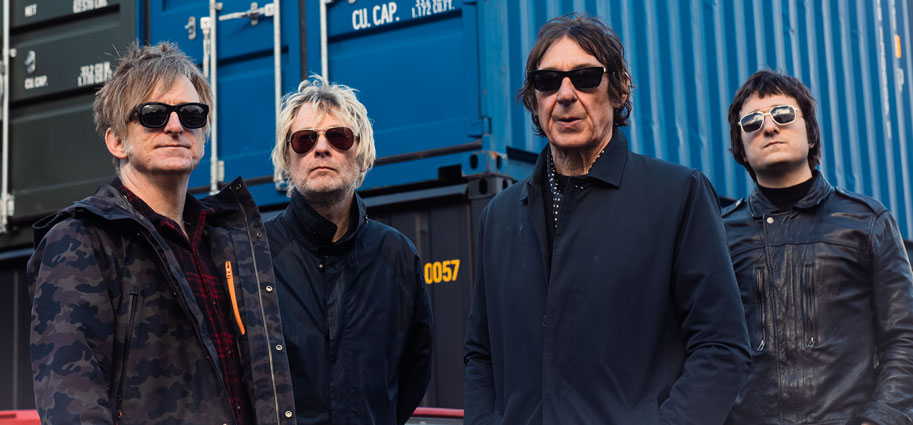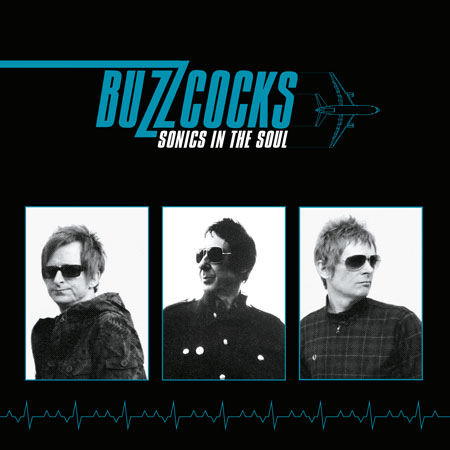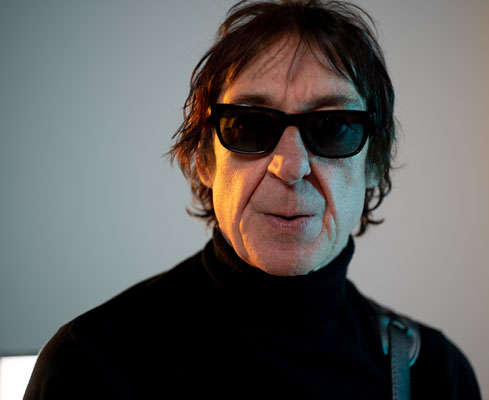BUZZCOCKS

Steve Diggle interview
by Robert Pally
(October 2022)
Veteran English punk rock band Buzzcocks recently released a new album after 8 years called Sonics In The Soul. The group had become identifiable with singer/guitarist Pete Shelley right up to his death in December 2018. Singer/guitarist Steve Diggle, a band member from almost the very beginning and a fixture since then, decided to keep the band flag flying. For anyone side-eying this decision, remember that the group was originally led by Howard Devoto, who left after their first record, leaving Shelley to take over. And so we enter a new phase of the band.
In this interview, Diggle, talks about the pandemic, H.G. Wells, Pete Shelley, death and inspiration.
PSF: Your last album The Way was released in 2014. What took you so long for a new one?
SD: After The Way was released, we went on tour for at least 2 years. Traveling the world. So, it took some time to come up with another one. Also, I think Pete Shelley did not want to do anymore albums. So, we just continued touring. But here we are now with a new album. It's very important to me to keep up doing new songs.
PSF: Sonics In The Soul was recorded during the pandemic. Do the songs reflect this?
SD: Yes. We recorded it when things coming out in the pandemic. There are bits of influences on there. You write about what is going on at that time. There are elements and influences of how the world felt, how I felt and everybody else. The song "Don't Mess With My Brain" is influenced by the pandemic. The pandemic put a cloud on everybody's mind at that time. The world was in a state of chaos. Also, some nihilistic things were influenced by that. On the same time, I tried to keep on track to make an Buzzcocks album. Being optimistic.
PSF: How did you cope with the pandemic?
SD: I was doing fine. Being a musician and a songwriter, you are working isolated all the time anyway. The pandemic gave me more time to look into the songs, time to write them, to consolidate them. It was a moment of self-realization of us all. You had to look inside yourself. As a songwriter you look into yourself anyway. The pandemic went hand in hand with that really. Nothing new for me. Just the world had stopped.
PSF: Which songs on Sonics In The Soul are your favorites?
SD: They are all my favorites. You know the whole album is a journey. I tried to make it a classic album. You put it on and then you go on the whole journey. There could be a lot of singles of the album. You could cherry-pick them. At the end of the album you should have the experiences of a journey. That was my goal. It's like David Bowie's album Diamond Dogs. You must listen to the whole album to get the whole picture. I tried to make a classic album like in the old days. Like reading a book. You must get to the end before you know what is happening.

PSF: My favorites are "Bad Dreams" and "Just To Let It Go."
SD: I love them as well. "Bad Dreams" got a classic vibe and it is very hypnotic. It is kind of universal. Everybody had a bad dream. We already played it live and it was well received. The same with "Just To Let It Go." We have been playing that live too. And the people loved it. We had instant reaction on both songs.
PSF: "Experimental Farm" sounds pretty punkadelic. What inspired that song?
SD: During the pandemic, I was in Greece at one point. The only English book in a shop was H.G. Wells The Invisible Man & The Food Of The Gods And How It Came To Earth. I thought this is a kind like the pandemic. An invisible man with a mask. In the Food Of The Gods, a scientist went down to a farm and said "Feed the chicken this and they will grow bigger." The whole thing got out of control and rats were growing bigger and butterflies were growing bigger. We are sometimes at a point where you don't know what you are eating. In these modern days, it's important to have natural products. Otherwise It can lead to diabetes or other diseases. "Experimental Farm" is about that. We don't know what we are messing with our food. It's a political song.
PSF: I read that you said that post-Shelley will mark a new era for the band. How do you mean that?
SD: The new album marks a new era, a new spirit. You only can go forward. It will never be the same. But nothing is the same in life anyway. Each day is a new day. This album is also a transition album. Remembering and taking some elements the Buzzcocks are known for and trying to move on. Sonics In The Soul is like a bridge album. I hopefully will do even different things on the next one. When people think we know the Buzzcocks we will try to come up with something new. As a songwriter, you always have to challenge yourself.
PSF: The early Buzzcocks inspired other bands to release music and start labels. In what way, do you think, do you inspire people today?
SD: We always had strong songs with great guitar riffs, that people could sing along. I think that is a continuation of our legacy. With this new album, you could tell it's the Buzzcocks, it's the Buzzcocks 2022. The same with The Way. This album is the Buzzcocks too, but differently. You cannot do the same songs every time. You have to do twist and the turns. Its like Picasso. He did cubism and then he did the 'blue period.' I think that is important when you follow a band. You should go on a journey with them. Sometimes you don't get it, sometimes you think "wow." Many great bands like The Beatles, Bowie or Bob Dylan never did the same album. That is the creativity.
PSF: What were the high points and low points in your musical career?
SD: High points are our great songs and our good live shows. Our audience gets involved in our shows. The people will go "wow, that's awesome." It's a high point when you get good feedback from the audience. A high point is also when you make a great album like the new one. Hopefully, it will inspire other bands.
I don't know any low points maybe some hangovers I had (laughs). We all have bad days and bad dreams sometimes. The low points are the things you call "life." Life goes up and down. You should take the highs and the lows. You can learn a lot from low points.
PSF: You tour a lot. What was the best concert you ever did?
SD: Pretty much all of them where. We played Madison Square Garden in New York (ED NOTE: opening for Pearl Jam in 2003; an amazing show), we played the Coachella Valley Music festival in the San Bernardino desert in 2012. These were amazing moments. Its always a new place, a new crowd and a new excitement. I try to get a good connection with the audience. When you get a connection through rock and roll you will see god, the devil and everything.
PSF: Will you continue as a trio (Steve Diggle, Chris Remington, Danny Farrant) or get a replacement for Pete Shelley?
SD: You cannot replace Peter Shelley. Live, we have Mani Perazzoli who also does backing vocals. He has been with us for a few years now. He joined before the pandemic and fits in very well. Mani is part of the team now.
PSF: In what way did the death of Pete Shelley affect you?
SD: I was devastated. Pete and I had been together since the age of 20 (Steve is 67 now). It's been a long journey. I spent a lot of time in pubs with him. He was my friend, my mate. We were like brothers. It wasn't just musically. It was also a personal thing. But you have to cope with it. I experienced a lot of deaths in my life. We joined Joy Division on the road. Their singer Ian Curtis killed himself. We went with Nirvana on their last tour. Kurt Cobain killed himself. I am a kind of used to that. My dad died years ago. When I was 17, I was in a car crash where a good friend of mine died and I survived. You have to accept that people die. One da,y I will die too. You can not turn the clock back. You just have to go forward. You should not put yourself in a state where you say "Somebody died, I cannot function anymore." You are still in the land of the living.
PSF: Did you ever think "I am too old for punk rock now"?
SD: (laughs) Yes, when I was about 26. (laughs again) Punk rock keeps you young. You never really grow up. I still love it. I still think it is important. And many other people do too. I like to make new records, hopefully great records that people will receive well. That inspires me and excites me. We are not just doing the old hits when we get on tour. We will play some of the new songs too. Not many bands can do that and get applauded. There is still life in this thing called Buzzcocks. You don't think about the age then. (laughs)
PSF: Are there any old Buzzocks songs that you embarrassed of?
SD: I am still ok with most of them. There are probably one or two were I think I could have done this or that better.
PSF: Can you give me an example?
SD: There is a song called "Running Free" (from A Different Kind Of Tension). A DJ in America played that a lot and said it was one of his favorites. When I sang it in the studio, I just put a rough vocal down. It was 6 o'clock in the morning and we had taken a lot of drugs. It was in a time when we were at the point of splitting up. So, I never went back to do proper vocals. Which I do regret. (laughs). Still, the song has its charm.
PSF: What are the next plans you have with Buzzcocks?
SD: They are sorting out a tour in autumn. So, hopefully we can tour around the world. We had a big American tour canceled a month before they announced the lockdown. Also, I am half way through the next album.

And this write up of Buzzcock's Sprial Scratch
And see the Buzzcocks website